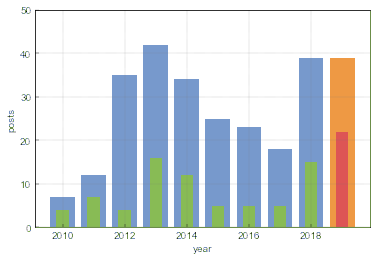Quite productive 2019
The topic we have started last year, opinion dynamics, has carried us through all of the 2019 and will likely remain an important topic in 2020. It is quite interesting and still developing research direction, which has potential to innovate social and political sciences as well as physics (at least in regards of understanding open systems) and computer science.
As can be seen in the figure below, we have published 39 posts (the same number as in 2018) and 22 interactive models, which is our new best result. I am not completely sure if I can keep this tempo up, especially as my postdoctoral project will soon end, but lets hope for the best.
 Fig. 1:The number of posts written in English and still available on this iteration of Physics of Risk. The wide bars represent total number of posts for each year since 2010, while the narrower bars represent a number of posts with 'Interactive models' tag.
Fig. 1:The number of posts written in English and still available on this iteration of Physics of Risk. The wide bars represent total number of posts for each year since 2010, while the narrower bars represent a number of posts with 'Interactive models' tag.So, for 2020 I plan to keep on writing about opinion dynamics, especially because I haven't yet written about new results I published during my postdoctoral research project. Some of these results will likely lead us to a related topic of human mobility. I would also like to write about some economic models, which would highlight the dark side of the free market.
